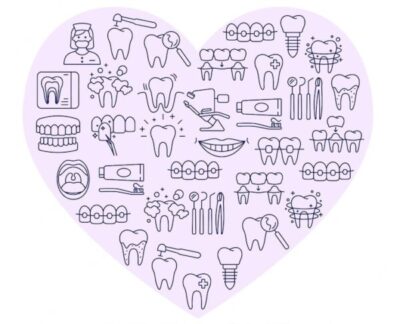Is it true that a healthy mouth equals a healthy heart? The research is increasingly saying “yes”. Heart disease is a major issue all over the world. Poor oral health is also a problem. Could brushing and flossing your teeth help you have a healthier heart? And could dentists look inside your mouth to see if you have heart disease? The answer is Yes.
The link between Gum disease and a healthy heart:
What is the link? In a nutshell, inflammation or swelling causes artery hardening, also known as atherosclerosis. This is a condition that makes blood flow to your heart difficult. It increases your chances of having a heart attack or stroke.
Inflammation is another sure sign of gum disease. The main symptom is sore, swollen gums. Gingivitis, which causes red, painful, and tender gums, and Periodontitis, which causes infected pockets of germy pus, are the two main types. Periodontitis is the type that causes concern about heart problems. It promotes the spread of bacteria and other toxins below the gum line.
Your gums are very vascular, which means they are densely packed with blood vessels. And your mouth is filled with bacteria. If you disturb the gum layer even slightly, bacteria will enter your bloodstream, which can cause inflammation throughout the body. Inflammation is one of the primary causes of damage to blood vessels, including those in the heart.
Another Consideration:
While bacteria most likely play a role in dental heart health, doctors believe your lifestyle choices also play a role.
People who have periodontal disease also have poor health habits in general. They aren’t looking after themselves. Many of them are smokers. They are most likely not exercising and may not be eating well. We know that all of these factors are strong predictors of heart disease.
Many people who have periodontal disease also have diabetes, which is a major risk factor for heart disease.
What Can You Do for Your Heart and Prevent Heart Disease?
- Eating Healthy: Choosing healthy foods aids in weight management and provides your body with the nutritional balance it requires to function optimally. While limiting sugar, choose a variety of colors in your fruits, vegetables, lean meats, and complex carbohydrates.
- Regular Physical Activity: Maintaining a healthy weight requires both good food choices and regular exercise. Aerobic exercise strengthens your heart and lungs, whereas weight-bearing exercises strengthen your muscles and bones. A good balance of both is ideal.
- Avoid Smoking: Smoking increases the risk of heart disease as well as a number of other diseases. There is no better time than now to quit smoking. The advantages of quitting begin almost immediately, and each day you go without smoking improves your health.
- Manage Your Stress: High blood pressure, high cholesterol, and stress are all risk factors for heart disease.
- Maintain a Good Dental Care Routine: Maintain your good oral health by brushing your teeth twice a day for two minutes each, flossing and using mouthwash on a daily basis, and chewing sugar-free gum after meals when you can’t brush your teeth.
- Keep track: Understand the symptoms of gum disease so that you can seek treatment when necessary. Swollen gums that bleed when you floss, brush, or eat; teeth that appear to be separating from the gums or are loose or missing; bad breath or taste in your mouth; or a visible infection are all symptoms of gum disease.
- Consult your dentist: You should see your dentist at least twice a year as part of your ongoing health team for regular dental check-ups. Make sure your dentist is aware of any medications you are taking or any heart conditions you may have.
Take a proactive approach to maintaining the health of your smile rather than waiting until you have symptoms. After all, a healthy mouth contributes to a healthy heart!
Healthy Heart and Gum Diseases





